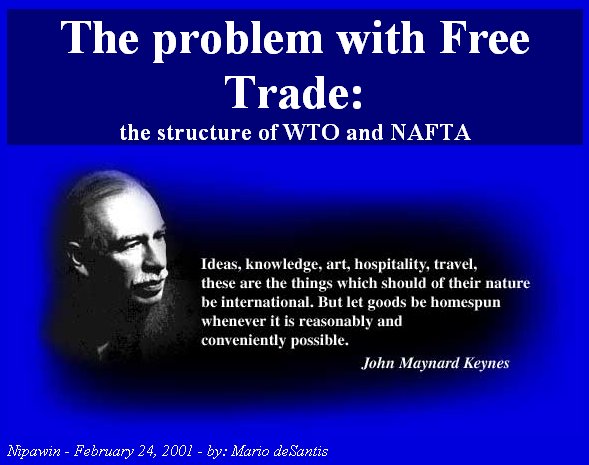Learning Stories
by
Mario deSantis
mariodesantis@hotmail.com
“I am a Canadian, free to speak without fear, free to worship in my own way, free to stand for what I think right, free to oppose what I believe wrong, and free to choose those who shall govern my country.” - -The Rt. Hon. John Diefenbaker, Canadian Bill of Rights, 1960
“The whole judicial system is at issue, it's worth more than one person.”--Serge Kujawa, Saskatchewan Crown Prosecutor, 1991
“The system is not more worth than one person's rights.”--Mario deSantis, 2002
Ensign Stories © Mario deSantis and Ensign
|
|
I remember when sometime ago our past Premier Roy Romanow was hailing British Prime Minister Tony Blair's Third Way while his own Saskatchewan Way was falling apart and being responsible for further dividing the rich from the poor(2). And today, as Tony Blair addressed both our senators and parliamentarians we were able to get a glimpse of Tony Blair's rational acumen of his Third Way, or rather what has turned to be synonymous for Free Trade(3). In this speech, Tony Blair defended vigorously Free Trade and attacked anti-globalization critics by stating
We are supposed to have governments for the people, but this is not the case anymore. Our governments have turned their back to the people and they are now posturing for the killing of sincere protests with force and determination, and I only hope that Tony Blair is not going to use his planes and missiles as he has been doing today in the Middle East(4). We have a difficult road ahead to restore democracy, and this is not a matter of capitalism or socialism anymore, this is a universal matter, as universal as trying to breath fresh air and trying to drink fresh water. We have the natural gift to communicate and trade and as our economies become more knowledge dependent so our motivation to break regional borders become more compelling. And economist Paul Krugman was right when in the late 70s he supported the theoretical advantages of international trade(5). However, today's Free Trade within our globalization of the economies is not working and it is satisfying the vested interests of the multinational conglomerates. And Tony Blair is wrong when he says that the current Free Trade is key to the development in the poorest parts of the world. And the late Donella Meadows was right when she wrote that we can conduct orderly and profitable trade in ways that do not oppress workers, communities, or the environment. We urgently need to do that.(6) And our social economists have ascertained that the current globalization of Free Trade is inherently responsible for our social inequality around the world(7) while pointing out that our natural social and economic growth is complementary with social equality(8). And this is where the problem is: the present structure of Free Trade as represented by the World Trade Organization (WTO) and the North American Free Trade Agreement (NAFTA). References/endnotes Relevant political and economics articles http://www.ftlcomm.com/ensign 1. When Protectionism Is A Good Thing, by Herman E. Daly, PCDForum. January 25, 1994 Column 67 http://iisd.ca/pcdf/1994/67daly.htm 2. A Good Samaritan and Premier Roy Romanow's Third Way, by Mario deSantis, September 13, 1999 http://www.ftlcomm.com/ensign/desantisArticles/desantis69/desantis69.html 3. Fight for freer trade, Blair urges Ottawa, CBC Canada, February 22, 2001 http://cbc.ca/cgi-bin/templates/view.cgi?/news/2001/02/22/blair012202 4. Blair defends new Iraq strikes, BBC News, February 22, 2001 http://news.bbc.co.uk/hi/english/uk_politics/newsid_1184000/1184782.stm 5. Protectionism: Classical and Contempory Thoughts, by James deSantis, February 20, 2001. Paper written for Economics 400: History of Economic Thought, University of North Dakota 6. The WTO Protesters and the Powers that Be, by Donella Meadows | posted-12.3.99 | http://www.tidepool.org/gc/gc12.3.99.cfm 7. IRPP-CSLS Conference on the Linkages Between Economic Growth and Inequality, January 26-27 2001, Chateau Laurier, Ottawa, Ontario http://www.csls.ca/jan-01.html 8. Why We Don't Have to Choose between Social Justice and Economic Growth: The myth of the equity/efficiency trade-off, by Andrew Jackson, Director of Research, Canadian Council on Social Development, Fall 2000 http://www.ccsd.ca/pubs/2000/equity |
